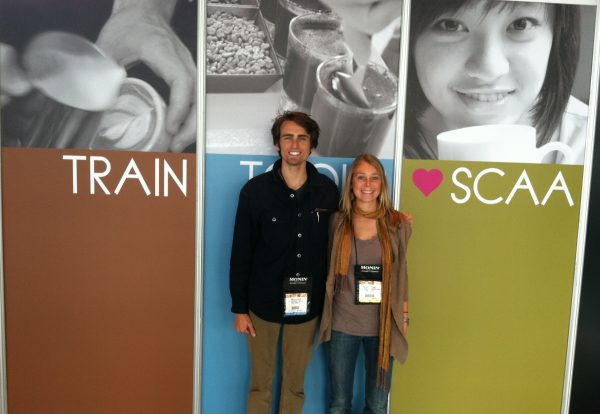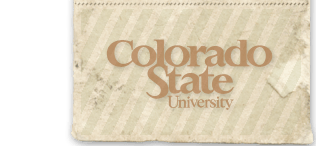Center for Fair & Alternative Trade
Ethical Trade Leadership Circle
Posted Spring 2013.

CFAT Research Associate, Elizabeth Bennett, and Messenger Coffee Co-Founder Trevor Welch met at the recent Specialty Coffee Association of America meeting to discuss Messenger’s commitment to ethical trade in the coffee sector.
The Center for Fair and Alternative Trade announces the establishment of the Ethical Trade Leadership Circle (ETLC). The ETLC will facilitate the Center’s mission of advancing the vision and practices of ethical trade on a global scale by connecting research with practice, social science with policy.
The Center is widely recognized as a leading research facility and think tank in the ethical trade sector. The Center team has been awarded major research grants from the Ford, MacArthur and National Science Foundations, along with funding from the United States Agency for International Development, Bohemian Foundation and several companies pursuing ethical trade on an international level.
ETLC membership is open to entrepreneurs and practitioners working on ethical trade in any sector—public, private, and non-profit—and across industries worldwide. Members will gain contact with the world’s leading experts in order to explore trends and opportunities in the ethical trade sector. In the process members will contribute to refining future research agendas through the Center’s international research network. ETLC members will also be invited to participate in workshops and other special events, and receive pre-published research summaries tailored to their areas of interest. Topics such as socially responsible sourcing, ethical certifications, and socially equitable international development will be at the fore of these conversations, as will be commodity and sector specific analyses.
As always, Center researchers will pursue scholarly endeavors for the purpose of scientific inquiry and contributing to the academic community. However, the establishment of the ETLC allows these activities to inform—and be informed by—the real-world questions and problems entrepreneurs and practitioners face in pursuing ethical trade. For companies and organizations that aim to be at the forefront of ethical trading, the ETLC presents a unique opportunity to innovate and collaborate with the leading researchers in the field.
The ETLC membership already includes several enterprises on the cutting edge of ethical trade:
Colibrí Consulting provides support to companies and nonprofit organizations seeking to create new social and environmental certification systems, as well as technical support to many of the systems that have emerged in recent years. Founder Michael E. Conroy is an academic economist who taught at the University of Texas at Austin for 25 years and subsequently at Yale University. He spent a dozen years in philanthropy helping to build many of the best known current certification systems. He is the author of Branded! How the Certification Revolution is Transforming Global Corporations.
Cultural Strategy Group is a brand and innovation consulting firm, applying Douglas Holt’s cultural branding theory to a wide range of marketing challenges. Through its subsidiary Planet Strategy, the Group helps social mission companies and NGOs with branding related to social and environmental issues. President Douglas Holt is the former L’Oreal Professor of Marketing at the Said School of Business at Oxford University and previously was Associate Professor of Marketing at Harvard University. His innovative marketing strategies have been adopted by companies like Ben & Jerry’s, Planet Green, HU Kitchen and New Belgium, among others. He is the co-author of Cultural Strategies: Using Innovative Ideologies to Build Breakthrough Brands.
Edison Coffee is a new coffee roaster based in Santa Barbara, CA. Founders Chris Matsch and Trevor Welch set out from a bright idea: create excellent coffee roasts from the best beans available while taking care of coffee farmers in a way that goes above and beyond the status quo. Through theirstreamlined distribution and relationship with producers, they provide customers with the highest quality cup ofcoffee while supporting coffee growers appropriately and responsibly.
The Center is also engaged in preliminary discussions with several other companies in the ethical trade sector. Ultimately the Center intends to grow the ETLC membership to include many of the companies and organizations in the United States and internationally who seek to not only maintain their operations at the forefront of current ethical practices, but who continually innovate to push our understanding of what is possible in the ethical trade sector.
